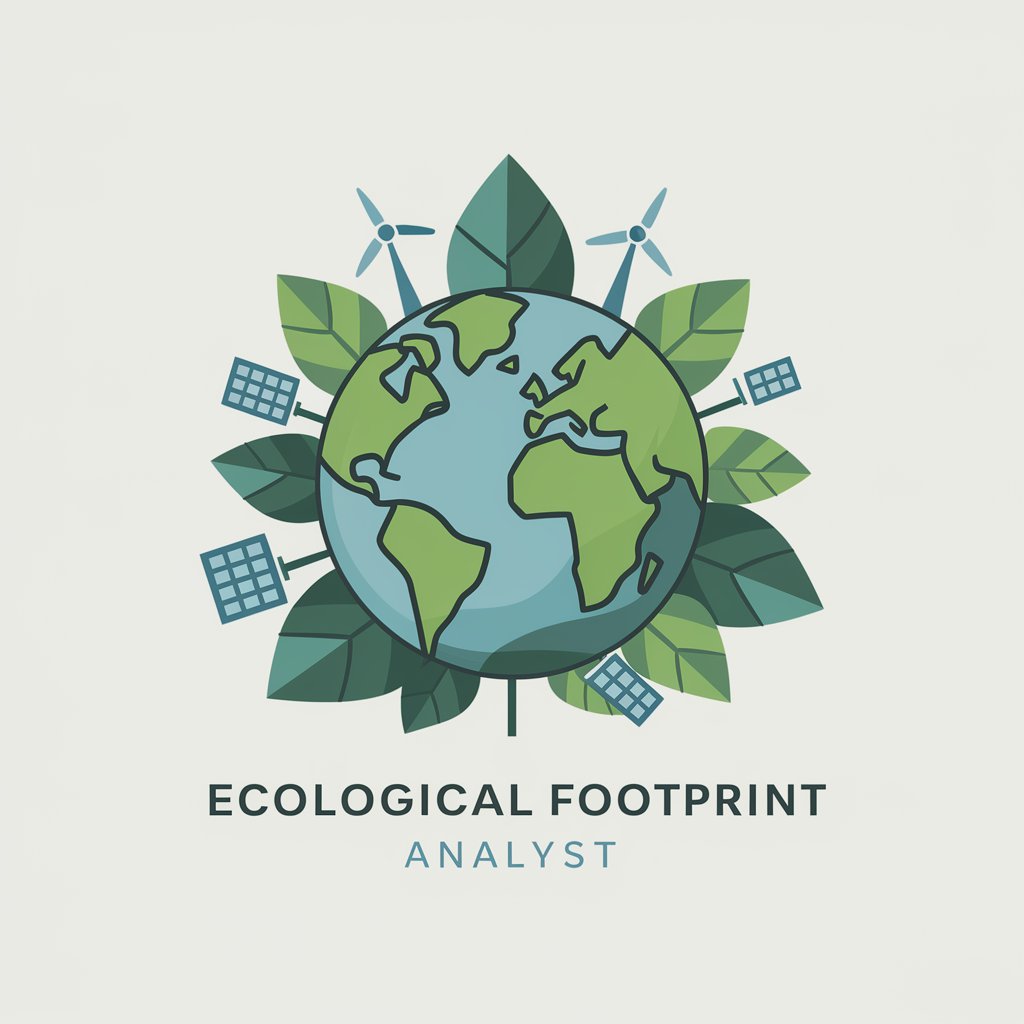
Ecological Footprint Analyst - Ecological Impact Assessment

Welcome! Let's explore ways to reduce your ecological footprint together.
Empowering sustainable choices with AI
Describe your daily transportation habits and their frequency.
What types of food do you typically consume, and how often?
How do you manage waste and recycling in your household?
Describe your home's energy sources and consumption patterns.
Get Embed Code
Ecological Footprint Analyst: Overview
The Ecological Footprint Analyst is a specialized tool designed to help individuals and organizations understand and mitigate their environmental impact. It operates by assessing various aspects of a user's lifestyle or operational practices, including diet, transportation habits, energy consumption, and waste production. Utilizing scientifically accurate data, the tool calculates the ecological footprint, which is a measure of how much land and water area a population requires to produce the resources it consumes and to absorb its wastes, under prevailing technology. For example, by analyzing a person's dietary preferences, such as meat consumption, and their daily commuting habits, the Analyst can estimate the carbon footprint and resource use associated with these activities. It then offers tailored suggestions on how to reduce this footprint, such as adopting a plant-based diet or using public transportation, thereby promoting sustainable living and environmental conservation. Powered by ChatGPT-4o。

Core Functions of Ecological Footprint Analyst
Footprint Calculation
Example
Calculating the carbon footprint of a user based on their meat consumption, car usage, energy consumption in their home, and frequency of air travel.
Scenario
A user provides information about their weekly meat consumption, daily commute by car including mileage, the average energy consumption in their home, and their air travel habits over the past year. The Analyst then calculates the total carbon dioxide emissions associated with these activities, offering a clear picture of the user's environmental impact.
Suggestion Generation
Example
Providing actionable recommendations to reduce one's ecological footprint, such as adopting a more plant-based diet, improving home energy efficiency, or choosing more sustainable transportation options.
Scenario
After calculating a user's ecological footprint, the Analyst identifies high-impact areas where changes can significantly reduce environmental impact. If the analysis reveals high emissions from car usage, it might suggest carpooling, using public transport, or switching to an electric vehicle. Similarly, for high home energy consumption, it could recommend energy-saving appliances, better insulation, or installing solar panels.
Ideal Users of Ecological Footprint Analyst Services
Environmentally Conscious Individuals
People who are aware of environmental issues and are motivated to reduce their impact on the planet. They benefit from using the Analyst by understanding their current ecological footprint and receiving personalized advice on how to live more sustainably.
Educational Institutions
Schools, colleges, and universities that aim to incorporate sustainability into their curriculum or operations. The Analyst can serve as an educational tool, helping students and staff quantify the impact of their lifestyles and campus activities on the environment, and explore ways to reduce it.
Businesses and Organizations
Companies seeking to understand and minimize their environmental footprint as part of their corporate social responsibility (CSR) initiatives. The Analyst can help them assess the impact of their operations, employee commuting patterns, and product life cycles, guiding them towards more sustainable practices.

How to Use Ecological Footprint Analyst
Start Your Journey
Visit yeschat.ai to access Ecological Footprint Analyst for a comprehensive assessment without needing to sign up or subscribe to premium services.
Input Lifestyle Details
Provide detailed information about your daily habits, including diet, transportation, energy consumption, and waste production.
Receive Your Footprint Analysis
Get a personalized report detailing your ecological footprint, understanding how your lifestyle impacts the planet.
Explore Reduction Strategies
Review personalized suggestions for reducing your environmental impact, tailored to your lifestyle and habits.
Implement and Track
Start incorporating suggested changes and use the tool regularly to track your progress and see how your footprint decreases over time.
Try other advanced and practical GPTs
Nostalgia
Reviving Memories, Exploring History

Career Coach Pro
Empowering Your Career Path with AI

Chat KeFu
Revolutionizing Customer Support with AI

Diabetes Predictor
Empowering health with AI-driven insights.

Moroccan Cuisine Explorer
Explore Moroccan Flavors with AI

AutoHotkey Specialist
Empowering your automation with AI-driven insights.

TOEFL Tutor
Elevate Your TOEFL Score with AI

UTM Wizard
Simplify Campaign Tracking with AI

StarCrypt:Osiris:CRPG
Navigate the dark, choice-driven odyssey.

Content Rewriter
Revolutionizing Content with AI-Powered Rewriting

Logic Creative Insight System
Empowering Creativity with AI Logic

Reiki Master
Empowering Your Reiki Journey with AI

Frequently Asked Questions about Ecological Footprint Analyst
What information do I need to provide to use Ecological Footprint Analyst?
You'll need to provide details about your diet (types of food you consume and their frequency), your modes of transportation (frequency and type), energy usage at home (type of energy and consumption levels), and your waste production habits (recycling and composting practices).
How can Ecological Footprint Analyst help me reduce my environmental impact?
Based on your lifestyle information, it generates personalized recommendations on how you can alter your habits in diet, transportation, energy use, and waste production to reduce your ecological footprint.
Is the Ecological Footprint Analyst suitable for businesses looking to reduce their carbon footprint?
While primarily designed for individuals, businesses can use it as a starting point to assess the collective footprint of their employees' lifestyles and identify areas where they can implement sustainability practices.
How accurate is the footprint calculation?
The calculation is based on scientifically accurate data and principles, but the precision depends on the detail and accuracy of the information you provide about your lifestyle.
Can I track my ecological footprint over time with this tool?
Yes, by consistently updating your lifestyle information, you can use the tool to track changes in your ecological footprint and monitor your progress towards more sustainable living habits.